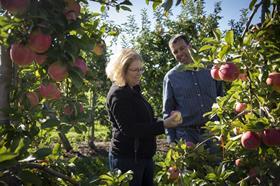
The Cornell AgriTechapple breeding programme has announced the release of three new apple varieties NY56, NY73 and NY109 – marketed as Cordera, Pink Luster and Firecracker, respectively.
The varieties, revealed by Susan Brown, the Herman M. Cohn professor of agriculture and life science, and research specialist Kevin Maloney on 2 September, will be available as an open release to US orchards, allowing them to grow the new varieties without licensing exclusivity.
The breeding programme has now developed more than 70 varieties since 1880, the most recent of which include SnapDragon and RubyFrost.
Brown said these apples are set to give growers an advantage by allowing them to replace older fruit with new varieties featuring the characteristics desired by modern consumers.
Brown said Cordera is a scab-resistant variety that retains its flavour and texture. Mark Bowker, orchard crop expert of Wegmans Organic Farm, which has been trailing Cordera for five years, said its disease resistance was an attractive feature.
'Having access to the varieties that Susan Brown and Cornell are working on allows us to look into the future in a way that will hopefully expose our customers to new and unique food experiences,'said Bowker.
'For us, disease resistance makes the performance of NY56 stands out in our orchard. Of course, it always comes down to flavour, and we think it has that too.”
Brown said the Pink Luster brings together attributes of Honeycrisp and Gala and is juicy with a bright pink-red skin, crisp texture while firecracker is considered a “triple threat” as it is suitable for eating, baking and hard cider production.
“Firecracker has a partial russet skin, and it has a unique combination of acidity and sweetness that produces really complex and evolving flavours,” Brown said. “It’s ideal for anyone who wants to go on a culinary adventure.”
Brown also thanked the efforts of a wide range of supporters that had contributed to the development of these varieties.
“Research and thorough testing are crucial in making a really good apple, but that takes a whole team,” Brown said.
“Research specialist Kevin Maloney, the Cornell AgriTech Field crew, researchers at Cornell AgriTech and the School of Integrative Plant Science, Cornell Cooperative Extension and the New York apple industry all deserve credit in collaborating to help deliver varieties that support the apple industry.”



